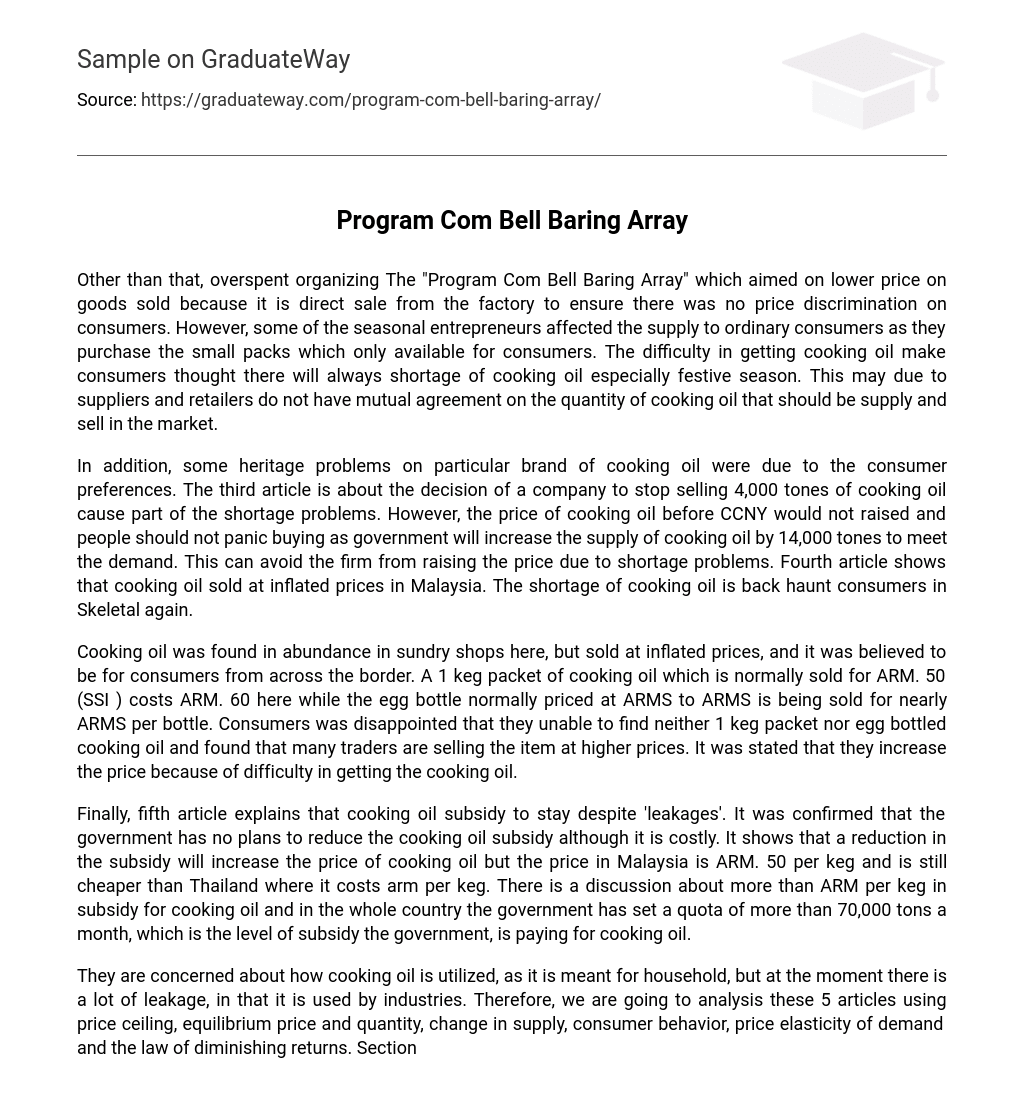Other than that, overspent organizing The “Program Com Bell Baring Array” which aimed on lower price on goods sold because it is direct sale from the factory to ensure there was no price discrimination on consumers. However, some of the seasonal entrepreneurs affected the supply to ordinary consumers as they purchase the small packs which only available for consumers. The difficulty in getting cooking oil make consumers thought there will always shortage of cooking oil especially festive season. This may due to suppliers and retailers do not have mutual agreement on the quantity of cooking oil that should be supply and sell in the market.
In addition, some heritage problems on particular brand of cooking oil were due to the consumer preferences. The third article is about the decision of a company to stop selling 4,000 tones of cooking oil cause part of the shortage problems. However, the price of cooking oil before CCNY would not raised and people should not panic buying as government will increase the supply of cooking oil by 14,000 tones to meet the demand. This can avoid the firm from raising the price due to shortage problems. Fourth article shows that cooking oil sold at inflated prices in Malaysia. The shortage of cooking oil is back haunt consumers in Skeletal again.
Cooking oil was found in abundance in sundry shops here, but sold at inflated prices, and it was believed to be for consumers from across the border. A 1 keg packet of cooking oil which is normally sold for ARM. 50 (SSI ) costs ARM. 60 here while the egg bottle normally priced at ARMS to ARMS is being sold for nearly ARMS per bottle. Consumers was disappointed that they unable to find neither 1 keg packet nor egg bottled cooking oil and found that many traders are selling the item at higher prices. It was stated that they increase the price because of difficulty in getting the cooking oil.
Finally, fifth article explains that cooking oil subsidy to stay despite ‘leakages’. It was confirmed that the government has no plans to reduce the cooking oil subsidy although it is costly. It shows that a reduction in the subsidy will increase the price of cooking oil but the price in Malaysia is ARM. 50 per keg and is still cheaper than Thailand where it costs arm per keg. There is a discussion about more than ARM per keg in subsidy for cooking oil and in the whole country the government has set a quota of more than 70,000 tons a month, which is the level of subsidy the government, is paying for cooking oil.
They are concerned about how cooking oil is utilized, as it is meant for household, but at the moment there is a lot of leakage, in that it is used by industries. Therefore, we are going to analysis these 5 articles using price ceiling, equilibrium price and quantity, change in supply, consumer behavior, price elasticity of demand and the law of diminishing returns.
Pure competition arrest normally will have equilibrium price when there is no intervention of government. Since cooking oil industry is a competitive market, therefore both sellers and buyers cannot control over the price. Under existing conditions such as price of related goods and input prices are held constant, we can see from the graph that the equilibrium market price for cooking oil will be ARM. 50 per KEG. Only at this price, the numbers of cooking oil supply (in units) is same with the numbers of cooking oil demanded from consumers, which are 6000 units.
At ARM. 50 and 6000 units of cooking oil, there is no heritage or surplus of cooking oil. So, the 6000 units of cooking oil is the equilibrium quantity and ARM. 50 is the equilibrium price. If this price is stable under existing conditions, this indicates that the price Of other related goods tends to be unstable. Consider what was happen in the market of cooking oil during festive season, producers supplied less and consumers demanded more than the quantity supplied at the equilibrium price. This will cause a shortage in cooking oil due to the excess demand.
Since there is neither surplus nor shortage in the market, price tends to remain stable in this situation. During he seasonal period such as Ramadan and Chinese New Year, Malaysia have experiences a shortage in cooking oil because the demand was exceed the supply. At this time, the price ceiling has been implementing by the government so that the seller charges the maximum legal price to a consumers. The price ceiling can make sure the seller would not simply raise the cooking oil price especially during festive season.





